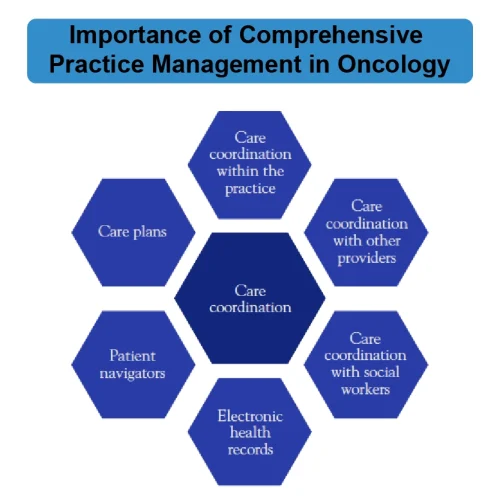Imagine an orchestra whose instruments harmonize perfectly, led by an invisible power. That conductor is oncology revenue cycle management in oncology practices solutions , ensuring financial operations run smoothly and patient care is excellent.
Let’s go to Miami, the healthcare innovation hub. In a world of growing medical institutions and specialists, revenue cycle optimization isn’t simply a nice song; it’s the beat of quality treatment. Consider it the unseen engine that drives Miami’s promise to its diverse community accessible, high-quality healthcare.
Revenue cycle optimization is important in this dynamic metropolis where cutting-edge medical advances meet a variegated tapestry of individuals seeking specialized care. Behind-the-scenes competence drives Miami’s healthcare greatness, not just financial numbers.
Miami’s oncology practices create a symphony of efficiency by fine-tuning revenue cycles in these busy hospital corridors. This keeps these institutions financially healthy and aligns with their core mission of providing top-notch, compassionate care to all who enter.
Understanding Oncology Revenue Cycle Management
The revenue cycle a complicated series of steps from patient enrollment to service reimbursement is the foundation of an oncology practice’s financial architecture. Each component of this cycle is crucial to the practice’s financial health.
Patient registration begins the revenue cycle and the administrative process during patient care. This stage sets the groundwork for the next steps, from demographic and insurance data collection to regulatory compliance.
As patients receive care, the revenue cycle involves billing, coding, and claims submission, which requires precision. Cancer therapies are complex and particular, making revenue cycle management difficult for oncology practitioners. Coding methods, managing insurance claims, and complying with changing legislation are all difficult tasks.
The reimbursement process can often be lengthy and complicated, delaying payments or denials. It takes great attention to detail and aggressive actions to address bottlenecks to navigate this reimbursement maze.
While revenue cycle management across healthcare disciplines is similar, oncology practices have unique issues that require specific techniques to ensure a smooth financial workflow.
The Miami Oncology Landscape
Miami’s oncology sector is a leader in modern healthcare. This city’s healthcare scene is growing due to the highest quality medical facilities, skilled healthcare personnel, and a diversified patient base.
Miami’s oncology healthcare sector has grown exponentially due to medical research, cutting-edge treatment methods, and a commitment to comprehensive cancer care. Miami’s specialized treatment centers and collaborative oncologist network offer hope to those seeking world-class oncology care.
Despite advances in healthcare, Miami’s cancer offices have revenue cycle management issues. Patient volume, insurance processes, and strict regulations make revenue cycle management difficult.
Considering these obstacles, opportunities exist. The diversified and robust Miami healthcare ecosystem fosters innovation and adaptation. Strategic methods and customized solutions can optimize revenue cycles, assuring financial stability and cancer patient care.
Best Practices in Oncology Revenue Cycle Management
Oncology revenue cycle optimization requires several critical measures to improve efficiency and effectiveness:
- Accurate patient data and effective scheduling underpin a seamless revenue cycle.
- Complex oncological procedures and therapies require exact coding. Billing and coding requirements must be followed to avoid income loss and errors.
- Revenue flow requires proactive claims management, diligent follow-ups, and denial prevention. Fast denial resolution is as important as claim submission.
- Advanced technology and robust revenue cycle management software can streamline procedures, automate repetitive jobs, and improve revenue cycle efficiency.
Importance of Comprehensive Practice Management in Oncology

Revenue cycle management is intertwined with practice management in healthcare. Successful Miami oncology clinics understand the link between practice management and revenue cycle efficiency.
Integrating revenue cycle management into practice management strategies builds a durable and successful healthcare organization. Integration helps cancer clinics streamline processes, optimize resources, and assure financial stability while providing excellent patient care.
Practice management that aligns with revenue cycle strategy creates operational synergy. This combination improves patient experiences, operational efficiency, and revenue cycle efficiency. This two-pillar connection underpins successful Miami oncology practices.
Oncology practice management succeeds by balancing clinical expertise with administrative skills. Delivering high-quality treatment while managing revenue cycle complexity requires maintaining this equilibrium.
Future Trends and Innovations
Technological advances and changing healthcare paradigms will influence Miami cancer revenue cycle management. AI-driven revenue cycle solutions, predictive analytics for claims management, and blockchain-based data security will transform revenue cycle operations.
These advances are expected to improve efficiency, revenue cycle issues, and cancer patient care in Miami’s changing healthcare environment.
Conclusion
Miami oncology offices need efficient oncology revenue cycle management to make money, grow, and provide excellent patient care. To succeed, operations must be considered holistically due to the complex interplay between entire practice management and a smooth income cycle.
As the Miami oncology sector evolves, revenue cycles will remain crucial to profitability. Oncology practice management is crucial to oncology offices’ performance, especially given today’s healthcare system’s complexity.
Effective revenue cycle management helps cancer practitioners serve their communities and provide the best care to all patients.
FAQS
Oncology revenue cycle management oversees patient registration, claim filing, and reimbursement to ensure seamless financial flow at a cancer care center.
Miami’s oncology offices need efficient revenue cycle management to stay financially stable and provide high-quality care. It simplifies, prevents income loss, and improves patient experience.
Technology and innovation transform cancer revenue cycle operations with modern software, predictive analytics for claims administration, and safe data handling.
Oncology offices face complex coding for specialized operations, different insurance policies, lengthy reimbursement processes, and strict compliance with ever-changing laws.










